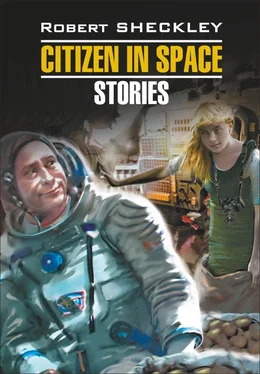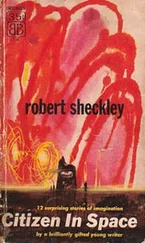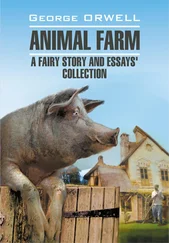That left ilitrocy. It was the oldest trick in the book, and he’d have to get close to work it. But he had nothing to lose.
And luckily, climatic conditions were perfect for it.
* * *
It started as a thin ground-mist. But, as the watery sun climbed the gray sky, fog began forming.
Herrera cursed angrily as it grew more dense. “Keep close together now. Of all the luck! [15] Of all the luck! – Как некстати!
”
Soon they were walking with their hands on each others’ shoulders, blasters ready, peering into the impenetrable fog.
“Herrera?”
“Yeah?”
“Are you sure we’re going in the right direction?”
“Sure. I took a compass course before the fog closed in.”
“Suppose your compass is off?”
“Don’t even think about it.”
They walked on, picking their way carefully over the rock-strewn ground.
“I think I see the ship,” Paxton said.
“No, not yet,” Herrera said.
Stellman stumbled over a rock, dropped his blaster, picked it up again and fumbled around for Herrera’s shoulder. He found it and walked on.
“I think we’re almost there,” Herrera said.
“I sure hope so,” Paxton said. “I’ve had enough.”
“Think your girl friend’s waiting for you at the ship?”
“Don’t rub it in.”
“Okay,” Herrera said. “Hey, Stellman, you better grab hold of my shoulder again. No sense getting separated.”
“I am holding your shoulder,” Stellman said.
“You’re not.”
“I am, I tell you!”
“Look, I guess I know if someone’s holding my shoulder or not.”
“Am I holding your shoulder, Paxton?”
“No,” Paxton said.
“That’s bad,” Stellman said, very slowly. “That’s bad, indeed.”
“Why?”
“Because I’m definitely holding someone’s shoulder.”
Herrera yelled, “Get down, get down quick, give me room to shoot!” But it was too late. A sweet-sour odor was in the air. Stellman and Paxton smelled it and collapsed. Herrera ran forward blindly, trying to hold his breath. He stumbled and fell over a rock, tried to get back on his feet —
And everything went black.
The fog lifted suddenly and Drog was standing alone, smiling triumphantly. He pulled out a long-bladed skinning knife and bent over the nearest Mirash.
* * *
The spaceship hurtled toward Terra at a velocity which threatened momentarily to burn out the overdrive. Herrera, hunched over the controls, finally regained his self-control and cut the speed down to normal. His usually tan face was still ashen, and his hands shook on the instruments.
Stellman came in from the bunkroom and flopped wearily in the co-pilot’s seat.
“How’s Paxton?” Herrera asked.
“I dosed him with Drona-3,” Stellman said. “He’s going to be all right.”
“He’s a good kid,” Herrera said.
“It’s just shock, for the most part,” Stellman said. “When he comes to, I’m going to put him to work counting diamonds. Counting diamonds is the best of therapies, I understand.”
Herrera grinned, and his face began to regain its normal color. “I feel like doing a little diamond-counting myself, now that it’s all turned out okay.” Then his long face became serious. “But I ask you, Stellman, who could figure it? I still don’t understand!”
* * *
The Scouter Jamboree was a glorious spectacle. The Soaring Falcon Patrol, number 22, gave a short pantomime showing the clearing of the land on Elbonai. The Brave Bisons, number 31, were in full pioneer dress.
And at the head of Patrol 19, the Charging Mirash Patrol, was Drog, a first-class Scouter now, wearing a glittering achievement badge. He was carrying the Patrol flag – the position of honor – and everyone cheered to see it.
Because waving proudly from the flagpole was the firm, fine-textured, characteristic skin of an adult Mirash, its zippers, tubes, gauges, buttons and holsters flashing merrily in the sunshine.
Thomas Eldridge was all alone in his room in Butler Hall when he heard the faint scraping noise behind him. It barely registered on his consciousness. He was studying the Holstead equations, which had caused such a stir a few years ago, with their hint of a non-Relativity universe. They were a disturbing set of symbols, even though their conclusions had been proved quite fallacious.
Still, if one examined them without preconceptions, they seemed to prove something. There was a strange relationship of temporal elements, with interesting force-applications. There was – he heard the noise again and turned his head.
Standing in back of him was a large man dressed in ballooning purple trousers, a little green vest and a porous silver shirt. He was carrying a square black machine with several dials and he looked decidedly unfriendly.
They stared at each other. For a moment, Eldridge thought it was a fraternity prank. He was the youngest associate professor at Carvell Tech, and some student was always handing him a hardboiled egg or a live toad during Hell Week.
But this man was no giggling student. He was at least fifty years old and unmistakably hostile.
“How’d you get in here?” Eldridge demanded. “And what do you want?”
The man raised an eyebrow. “Going to brazen it out, eh? [16] Going to brazen it out, eh? – Нагло пытаешься выкрутиться, да?
”
“Brazen what out?” Eldridge asked, startled.
“This is Viglin you’re talking to,” the man said. “Viglin. Remember?”
Eldredge tried to remember if there were any insane asylums [17] insane asylum – психиатрическая больница
near Carvell. This Viglin looked like an escaped lunatic.
“You must have the wrong man,” Eldridge said, wondering if he should call for help.
Viglin shook his head. “You are Thomas Monroe Eldridge,” he said. “Born March 16, 1926, in Darien, Connecticut. Attended the University Heights College, New York University, graduating cum laude [18] cum laude – ( лат. ) с отличием (о дипломе)
. Received a fellowship to Carvell last year, in early 1953. Correct so far?”
“All right, so you did a little research on me for some reason. It better be a good one or I call the cops.”
“You always were a cool customer. But the bluff won’t work. I will call the police.”
He pressed a button on the machine. Instantly, two men appeared in the room. They wore lightweight orange and green uniforms, with metallic insignia on the sleeves. Between them they carried a black machine similar to Viglin’s except that it had white stenciling on its top.
“Crime does not pay,” Viglin said. “Arrest that thief!”
For a moment, Eldridge’s pleasant college room, with its Gauguin prints, its untidy piles of books, its untidier hi-fi, and its shaggy little red rug, seemed to spin dizzily around him. He blinked several times, hoping that the whole thing had been induced by eyestrain. Or better yet, perhaps he had been dreaming.
But Viglin was still there, dismayingly substantial.
The two policemen produced a pair of handcuffs and walked forward.
“Wait!” Eldridge shouted, leaning against his desk for support. “What’s this all about?”
“If you insist on formal charges,” Viglin said, “you shall have them.” He cleared his throat. “Thomas Eldridge, in March, 1962, you invented the Eldridge Traveler. Then —”
“Hold on!” Eldridge protested. “It isn’t 1962 yet, in case you didn’t know.”
Viglin looked annoyed. “Don’t quibble. You will invent the Traveler in 1962, if you prefer that phrasing. It’s all a matter of temporal viewpoint.”
Читать дальше












